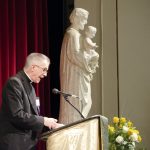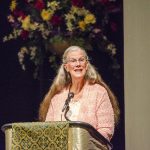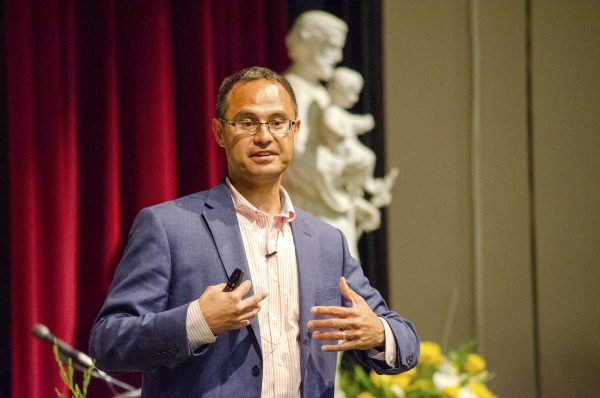Diocesan family returns to the conference
This year’s Midwest Catholic Family Conference was down-sized after last year’s cancelation because of the pandemic, but Kathleen Timmermeyer was delighted with the attendance.
“We’re pleased and blessed,” Timmermeyer said a few days after the Aug. 6-8 event held at Century II in Wichita. “We’ve heard only good comments. Even the guy doing our taping said he had listened to all of the talks and said there wasn’t a bad one in there.”
She and Jennifer Edwards co-directed the event.
Timmermeyer also praised the work and dedication of the many volunteers, although fear of the Delta variant may have reduced attendance and the conference’s volunteer base.
“I have to say it worked out the best it could work out under the circumstances. It was awesome,” she said.
Timmermeyer isn’t giving herself and Edwards much of a break.
“I had a conversation this morning about how we need to sit down and start talking about speakers we want for next year. We’ve already started planning meetings where we decompress this year and talk about how we can improve for next year.”
Fr. John Lanzrath

Fr. John Lanzrath, a priest of the Diocese of Wichita, talked about Fr. Emil Kapaun and St. Joseph during his presentation at the Midwest Catholic Family Conference. (Advance photo)
Fr. John Lanzrath opened the conference by talking about Father Emil Kapaun, his youth, and his formation in Pilsen.
“As he served as an altar boy, a seed was being planted in this young man,” he said. When he chose a confirmation saint, he chose St. Joseph.
“From a young age Emil knew God may be calling him to the priesthood,” he said.
Fr. Lanzrath then read a note Fr. Kapaun wrote while at Kenrick–Glennon Seminary in St. Louis about the simplicity and beauty of the Holy Family. “Because you are here you already know,” Fr. Lanzrath said in Century II’s Convention Hall, “Christian families must practice the virtue of self-sacrifice.”
He talked about his service to Mother Teresa’s Missionaries of Charity while studying in Rome and how they recognized the “call within the call.”
Father Kapaun recognized that call within the call by serving as a chaplain in the U.S. Army, he said. “Many times he risked his life on the battlefield to pull wounded soldiers to the safety of his foxhole.”
Fr. Lanzrath talked about the many ways Fr. Kapaun ministered to the young men “who found themselves in a world conflict half a world away.”
“War has a way of calling young people to recognize how fragile life is,” he said. “War has a way to instantly take the life of a soldier by a sniper’s bullet.”
Fr. Kapaun served in the war and became the face of Christ who served with him, Fr. Lanzrath said. He chose to be with his troops on the front line. “He wanted to be like Christ to the men he served.”
Fr. Lanzrath said on All Souls Day in 1950, 20,000 Chinese soldiers attacked 3,000 men of the 8th Calvary on a Korean battlefield.
“Many fled in retreat but Fr. Kapaun stayed behind with his injured comrades. He did not run from the likelihood of capture. He stood strong to remain with his boys. I wonder if Fr. Kapaun turned to the intercession of St. Joseph.”
Fr. Kapaun witnessed love to his men, captors
He was captured nearly 71 years ago by the Communists, Fr. Lanzrath said, describing the heroic behavior Fr. Kapaun had toward his men. “He continued to witness the love of Christ. He witnessed the Catholic faith not only to his fellow prisoners of war but also his captors.”
He remained faithful as a disciple of Jesus, Father said. From Nov. 2, 1950, to May 23, 1951, “Father Kapaun taught his troops and he continues to teach us how to be all man and all priest.”
“The enemy we fight today is the evil one and we must remember that the destination of our journey is the kingdom of God,” Fr. Lanzrath said. “St. Thomas Aquinas says our whole journey is we come from God and our journey in this earthy life is to return to God.”
Before his death on Easter 1951, Fr. Kapaun gathered his fellow POWs, he said. They prayed and sang hymns to God praising Jesus Christ for his victory over death.
“In this conference, we go to Joseph who protected Jesus and Mary in their battles,” Fr. Lanzrath said.
He then described the prison “hospital” where the POWs were taken to die. Fellow POWs tried to fight the soldiers who wanted to take Fr. Kapaun, Fr. Lanzrath said. Fr. Kapaun told them: “No. I’m going to a place where I’ve always wanted to go.”
Fr. Lanzrath said a fellow POW said, “Fr. Kapaun hated Communism and he hated what the Communist ideology made the Communists do. But he didn’t hate the Chinese.”
Fr. Kapaun asked one Chinese officer to forgive him for whatever he had done. “At the moment of death, Father Kapaun prayed for forgiveness from his captors.”
Fr. Lanzrath ended his talk by speaking about the opening of Fr. Kapaun’s cause for canonization and his posthumous reception of the Congressional Medal of Honor.
He described a phone call that Ray Kapaun, Fr. Kapaun’s nephew, received notifying him that Fr. Kapaun’s remains had been found, and how he was more surprised that his uncle’s remains had been found than if he had been told he had been beatified.
“How blessed we are to have a brother priest of the diocese who, God willing, will be canonized as a saint of the church. His life inspires us,“ Fr. Lanzrath said. “Emil went to Joseph. May we do the same.”
Kimberly Hahn

Kimberly Hahn talked about marriage and love at the Midwest Catholic Family Conference Aug. 6-8 in Wichita. (Advance photo)
Kimberly Hahn, the wife of theologian Scott Hahn and co-author of Rome Sweet Home, talked about biblical wisdom for marriage relationships at her Saturday talk.
To be a godly wife, Hahn said, a woman needs to understand that she is the daughter of the King of Kings.
“Proverbs 31:28 says, ‘Charm is deceitful, and beauty is fake, but a woman who fears the Lord is to be praised,’” she said.
“This woman pursues interior beauty. She fears the Lord,” Hahn said. “What does that mean? We hardly ever use that kind of phrase today.”
She then contrasted the difference between the understanding of God by Christians and Muslims.
“Both affirm that we should fear the Lord. But we see things very differently. In Islam, Muslims see themselves as slaves of a master God, and the intimate relationship between God as father and his child is absolutely foreign, even blasphemous.”
For Christians God is a father figure, Hahn said.
“We’re are called to childlike fear of our heavenly Father, which leads to faithful and faith-filled obedience – love. Fatherhood originates in God.”
For Christians God is not a taskmaster, she said, but one who lavishes love on his beloved children. “Rather than obedience flowing from the fear of the master’s whip, our love and obedience flow from the love we have for our Heavenly Father.”
A child will look at his or her father with love, respect, admiration, and a small amount of fear, she said. “But in fear of the Lord we respond initially with wanting not to affect, but much more wanting to please him.”
Jesus’ father is our father, she said. “That’s why he taught us the Lord’s Prayer.”
Edward Sri
Edward Sri, in a talk about virtues and love, used the story of a family who buys a piano for their child and tells that child to play the piano, without hiring a teacher.
“We believe you can be a great piano player,” the parents tell their child. “We want you to play the piano however you want. Express yourself. Be your own piano player.”
Sri, a theologian, author, and frequent guest on EWTN, said young people are in the same situation when it comes to the church’s teaching regarding chastity.
“They start hearing about the Theology of the Body,” he said. “I can’t tell you how many other people who said, ‘Why didn’t anyone teach this to me earlier? I wouldn’t have made all those mistakes in my life.’”
One of the reasons is because so many men lack a father figure, he said.
“Pope Benedict made a beautiful point. He said in the modern era, it’s not as if we just simply turned away from the gospel or turned away from Christianity. We’ve turned away from just basic human values,” Sri said.
Couples don’t know how to have dating relationships, they don’t know how to live marriage, and they don’t know how to build strong families, he said. “We have lost the art of living. In our era, we can’t even get bathrooms right.”
Sri said the understanding about virtues, which have their roots in Greek philosophers, stretches back 2,000 years. Unfortunately many today have not been formed with an understanding of virtues, he said. “We certainly didn’t get it in our school systems. I’ll bet 95 percent of Catholics couldn’t name the four cardinal virtues. And I’ll bet 99 percent of Catholics wouldn’t know how those virtues work together and what difference it makes for marriage.”
The four virtues of classical philosophy and Christian theology are prudence, justice, fortitude, and temperance.
Sri explained that we wouldn’t get into an airplane without a competent pilot or undergo surgery without an experienced surgeon, yet “couples jump into friendships and jump into dating relationships without ever asking the question of virtue. Does this person have the skills, the life skills, the basic life skills, the virtues, the dispositions, to live a good life, to love me?”
People jump into marriage, he said, without asking the question: Am I ready?
“Virtues give us the freedom to love,” Sri said.
Jim Bertrand, a science teacher and director of Field Operations for the Confraternity of the Holy Shroud, gave a detailed explanation about the Shroud of Turin in front of a life-size reproduction of the revered garment.
Other speakers
Jim Bertrand talked about the history of the shroud, explained the burial practices of the time, and detailed the many studies that have been conducted on the burial linen.
Jimmy Mitchell, pianist, and popular podcaster talked Saturday afternoon about how beauty leads us to God, who is the author of all that is good and true.
“All of us can recognize the power of beauty in our lives,” he said. “It’s not that we just want to become part of beauty, we want to become part of its source, God himself.
He said some of the most powerful expressions of beauty are not just in nature or architecture but in music. Mitchell played piano compositions in support of his belief.
Father Dennis McManus, a priest of the Archdiocese of Mobile, Alabama, talked Saturday about St. Joseph and on Sunday about spiritual warfare for the Catholic family.

